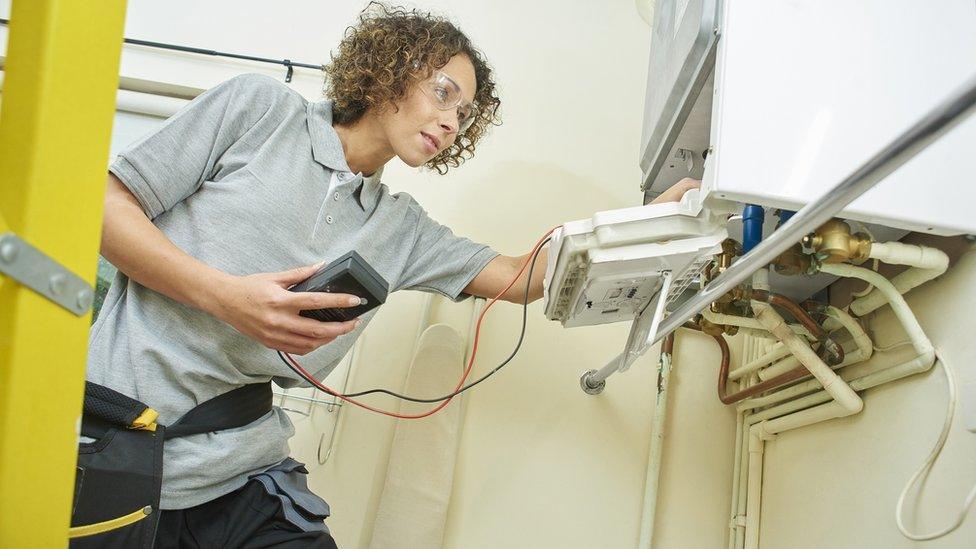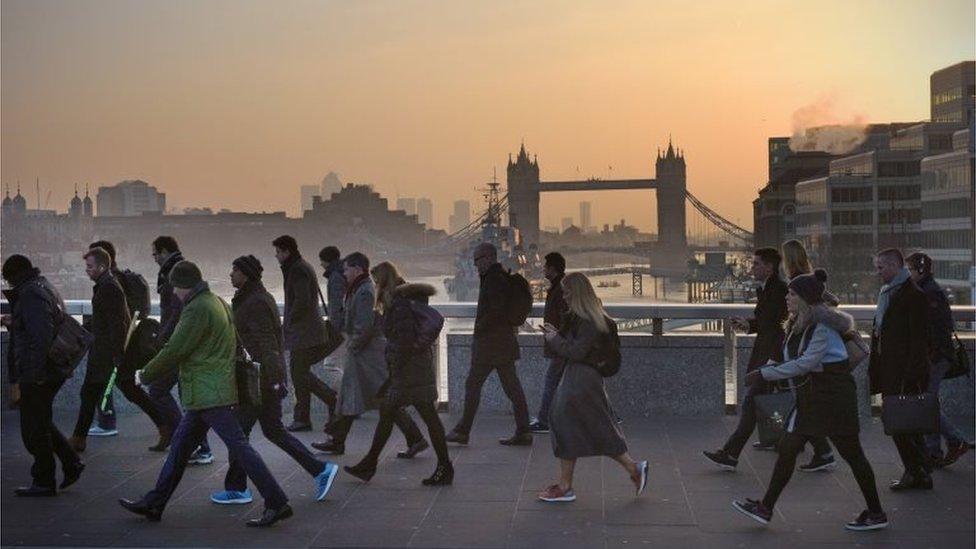'Chaotic' youth job scheme failing to deliver, MPs say
- Published
- comments

The Kickstart programme was launched to help young people into work
A £1.9bn scheme to help young people into work is helping far fewer than hoped, a committee of MPs has warned.
The Public Accounts Committee (PAC) said it supported the intention of targeted help for young workers during the pandemic but the £1.9bn "emergency intervention" Kickstart scheme has supported far fewer than predicted.
"Early delivery was chaotic," the MPs said in their report on Friday.
The government said the policy had helped 130,000 young people into work.
The Department for Work and Pensions (DWP) now forecasts that Kickstart will support 168,000 young people, fewer than the original prediction of 250,000, the report said.
The programme, which launched in September 2020, targets young people at risk of long-term unemployment.
The report said the DWP "neglected to put in place basic management information that would be expected for a multi-billion-pound grant programme".
The economic hit of Covid to young people was not as bad first predicted. However, the report found the DWP does not know why many young people who signed up for Universal Credit early in the pandemic have not since come off the benefit and into Kickstart jobs.
Dame Meg Hillier, chair of the PAC, said: "There are very unfortunate similarities across government's Covid response schemes: rushed implementation and too little track kept of whether a scheme was delivering what it promises - even given the unprecedented pressures at the start of the pandemic.
"In this case the department simply has no idea whether this scheme was worth the money, not least because it has little idea what was delivered for it," she said.
The report recommended the government try to claw back the scheme's £1,500 employment support costs where the employer has not used the money as it should have.

The PAC report said the programme will likely only place 168,000 people between ages 16 and 24 into job roles
What is Kickstart?
Under the Kickstart scheme, businesses apply to the DWP to create Kickstart places, which are then vetted for suitability.
People aged between 16 and 24 who are on Universal Credit are matched to roles by their job centre work coaches.
They are then interviewed by the prospective employer, which decides whether to give them a role.
For each successful placement, the government covers the national minimum wage for a six-month period, at 25 hours per week.
A further £1,500 grant is available per placement to help cover set-up costs and assist in developing skills.
'Categorically delivered'
A government spokesperson said Kickstart had "categorically delivered".
"It has given more than 130,000 young people opportunities to work, earn and improve their prospects. It responded to extraordinary circumstances at unprecedented pace, as part of the wider Plan for Jobs which has defied forecasts of unemployment rising to 12% - the headline rate is actually 4.1%," they said.
"We will consider the PAC's conclusions as we continue our mission to get people into work so they can take home more money," they added.


More than one year since the scheme was launched, with "stronger than expected economic growth", the DWP is now forecasting that Kickstart will support far fewer young people than envisaged - 168,000 compared with the original prediction of 250,000 - and will cost £1.26bn.
While this scheme was supposed to provide specific help during the pandemic, it could have solved a much longer-running problem - finding a route back into work for young people who've been unemployed for ages, in fact some may never have worked at all.
Instead, what the committee's report suggests is a spending splurge, with little help or guidance to employers, no way of measuring success, and no way of seeing that the right young people were recruited.
At a moment in the pandemic when the government's purse-strings were loosened for all the right reasons this scheme should have had a lasting legacy of bringing left-behind young people into the world of world.
This report suggests an open goal has been bungled. An expensive price tag and little to show for it.

- Published24 February 2022

- Published24 January 2022

- Published15 February 2022
